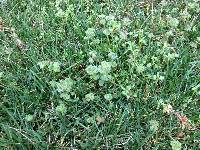Fall is the Time to Control Broadleaf Weeds
They’re out there, beginning to make their annual appearance. They are not plainly visible until spring when it will be too late to eradicate them. But if one looks closely, they can be seen in the fall. “They” are weeds just waiting for spring’s arrival to emerge in lawns, adding their undesirable color and texture. Fall is the ideal time to control many lawn weeds.
Reasons for treating for broadleaf weeds in the fall
 Broadleaf weeds such as dandelions, henbit and chickweed all germinate in the cool, moist periods of September and October. They overwinter as small plants no larger than a quarter. Arrival of warm spring weather promotes the weeds’ rapid growth and flowering. Once plants reach the flowering stage, they are practically impossible to control. The advantage of fall control is that the seedlings are not well-established. This is the stage at which control methods are most effective.
Broadleaf weeds such as dandelions, henbit and chickweed all germinate in the cool, moist periods of September and October. They overwinter as small plants no larger than a quarter. Arrival of warm spring weather promotes the weeds’ rapid growth and flowering. Once plants reach the flowering stage, they are practically impossible to control. The advantage of fall control is that the seedlings are not well-established. This is the stage at which control methods are most effective.
Granular VS liquid chemical control of broadleaf weeds
There are several products on the market that are effective for control of these fall germinating weeds. They are available in both granular and liquid formulations. Both are effective, but each has some advantages and disadvantages.
Liquid herbicides normally are more effective than granular products. Lawns should not be mowed for several days before and after the application to allow maximum uptake and translocation of the herbicide. Timing is important. It is best if there is not rainfall or water applied for at least 24 hours after the application.
Granular products often come mixed with fertilizer, which can be convenient. If using a combination product, adjust fall fertilization schedules accordingly. The grass should be wet when applying a granular herbicide. This dampness causes the granular herbicide to stick to the foliage for maximum absorption. It is best to apply the product in the early morning when dew is present or after a rain. When liquids are used, there should be no additional moisture on the lawn for at least 24 hours after the application.
Protect fall planted grass seedlings
Fall planted grass seed should not be treated with an herbicide until the new grass seedlings have been mowed two or three times, depending on what product was applied. Instructions on labels need to be carefully read to determine proper application times for newly seeded lawns.
Another advantage of applying herbicide treatments in the fall rather than spring is there will be less damage to non-target plants. Warm spring temperatures, winds and succulent plant growth can create problems for trees, shrubs and flowers often damaged by the herbicide drift. Cooler fall temperatures and the dormant state of most plants greatly reduce this problem.
In the spring, the lawn should be relatively weed-free without undesirable bright yellow dandelions, purple henbit and lime-green chickweed. With properly timed weed control, the lawn will be a carpet of dark green, a proud site for the homeowner!
Dennis Patton, Horticulture Agent
Do You Have Questions?
Have questions? The Garden Hotline is staffed by trained EMG volunteers and Extension staff who will assist you with questions.
Phone: (913) 715-7050
Email: garden.help@jocogov.org